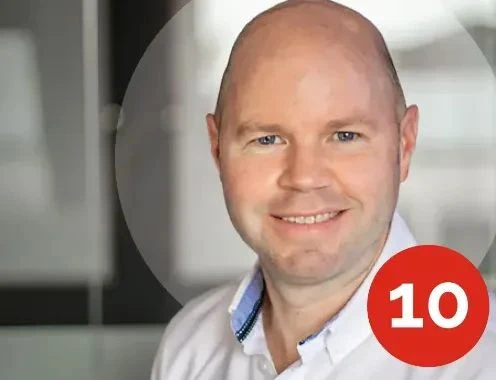- Jobs
- Candidates
- Candidates
- Candidate Services
- Candidate Testimonials
- Employers
- Employers
- Employer Services
- Client Testimonials
- Specialisms
- Executive Interviews
- Podcast
- News & Insights
- News & Insights
- News & Insights
- Events
- About
- Login / Register
Looking for an Employee?
Contact UsLooking for a job?
Social

We often see a natural synergy between Procurement and Finance, with both functions contributing to the financial wellbeing of an organisation - albeit their areas of focus are distinct.
Over time, businesses have recognised the importance of aligning Procurement and Finance functions to achieve common business goals, optimise financial performance, and enhance resource management. This has led to increased collaboration and a recognition of the interdependencies between the two functions.
Following recent economic pressures and Supply Chain disruption, we have seen that it is more apparent than ever that the relationship between Procurement and Finance needs to be leveraged to its full extent to ensure business success.
We see collaborations between the functions, in terms of shared skills and qualities required for success in both roles. By recognising these shared competencies, organisations can create a cohesive and efficient team that collaborates effectively to drive financial performance and Procurement success.
For the most successful organisations, Procurement jobs are no longer seen as a branch of Finance, but a genuine business partner and critical heart of Finance-related decisions.
Would you be interested in an event focusing on how Procurement and Finance functions can adapt and grow together for the future? Please reach out to Sasha Gill, Senior Consultant, to share your thoughts: [email protected]
More insights

How to Shape HR Organizations to Enhance Efficiency
Armand Sohet has successfully shaped HR organizations across diverse industries to support business strategy and enhance efficiency.
Armand’s 20-year HR career has taken him to some of the most prestigious businesses in Europe, including his current position as Chief Sustainability, HR and Communications Officer at AkzoNobel in Amsterdam.
His expertise lies in streamlining processes, leveraging big data, and developing unique KPIs for the HR function.
“In my own work, for example, when I joined a year ago, I had 35 senior executives in a 300-person department - a lot for a streamlined operation,” he explains. “I removed 15 roles and created a structure that elevated team members in places like Vietnam, India, and Brazil. Now, with fewer, more focused leaders, our operations run more efficiently.”
Technology & productivity
Technology is a modern issue that teams and larger organizations are struggling to leverage, Armand believes.
“Technology and structure should serve us, not control us,” he says. “While tech promises efficiency, it often has the opposite effect.
“Take ERP systems, like SAP, which initially promised streamlined processes. Over time, they’ve added layers of complexity to functions like Finance and HR. The productivity gains we expected haven’t materialized.”
So, how can high-performing teams utilize technology to enhance efficiency? “A simpler structure, supported by using technology as a tool, rather than a master, can reduce complexity and improve outcomes,” Armand explains.
Understanding data
“When I joined Akzo, despite all the hard work that had been put in, no one was looking into the data or using it,” says Armand. “It’s important to understand it; without that, it’s really hard to make progress.”
Armand shares the story of a student he met while teaching at Zurich University, who “had no clue about data or HR”. Armand saw potential and invited him to complete his thesis at his company.
“He wasn’t even 21 years old, but he replaced the entire Compensation & Benefits team – three people – as he understood the numbers and the mechanisms.”
Armand explores how this experience would influence his recruitment strategy: “Today, if I wanted to hire for other positions, I would continue to hire different profiles. I have already recruited people from Finance, Accounting, R&D, and Marketing.”
Are you an HR professional looking to enhance efficiency in your organization? Our HR recruitment specialists work with leaders like Armand to build and develop high-performing teams.
You can find out more about our bespoke services and who to contact in your region through our website: https://www.emearecruitment.com/pages/human-resources

Top Shared Service Center Locations Around the World
Although Shared Service Centers can be found all over the globe, some locations are better suited than others for cost efficiency, skilled talent, and strong infrastructure.
Businesses typically establish a Shared Service Center to centralize their back-office functions, such as Finance, HR, IT, and Procurement. Choosing the right location for your SSC is crucial for operational efficiency, cost-effectiveness, and long-term sustainability.
Strategically, organizations should take the following into account:
- Availability of skilled talent
- Quality vs. cost
- Local infrastructure
- Timezone and proximity to headquarters
We’ve reviewed some of the top Shared Service Center locations globally for those in the early stages of their research:
Central and Eastern Europe
Central and Eastern Europe (CEE) has firmly positioned itself as one of the top regions for SSCs, thanks to a highly skilled and multi-lingual workforce, competitive labor costs, and a well-established business environment.
Poland, in particular, has become an SSC hotspot (second globally, behind India), with over 1,900 centers. Cities like Warsaw, Kraków, Wrocław, and Gdańsk have strong university systems and extensive foreign language capabilities.
Budapest, too, is a prime location, with a high proportion of professionals in Finance, Accounting, and IT.
Czechia, Romania, and Slovakia are also attractive options.
India
India’s SSCs account for 15% of the global market. It has long attracted multi-national businesses to cities like Bangalore, Pune, Hyderabad, and Chennai thanks to its cost-effectiveness, large talent pool, and advanced digital capabilities.
India has a well-educated workforce, strong IT infrastructure, and a significant English-speaking population.
Latin America
A region currently gaining traction in the SSC market is Latin America, with countries like Costa Rica, Mexico, and Colombia attracting new centers.
Latin America is particularly attractive for North American businesses, offering nearshore operations and similar/overlapping timezones. This ensures more efficient communication and collaboration than alternative locations.
Talent Insights
At EMEA Recruitment, we specialize in supporting businesses through the competitive landscape of Shared Service Center talent acquisition, including assistance with choosing the right location for a new center.
Our Global SSC team focuses solely on recruiting for SSCs across the globe, allowing us to develop our expertise in this field. Utilizing decades of experience in the SSC sector and our international recruitment knowledge, we provide up-to-date talent insights bespoke to your business and location.
We review the latest industry data from our own database and platforms such as LinkedIn to provide bespoke insights for your organization, which can help you understand which location is best suited for your needs.
If you’re looking for a strategic partner, get in touch with Matt Foster: [email protected]

What your Business Needs to Know about Shared Service Center Recruitment
As organizations look to combat changing global economic conditions, Shared Service Centers are continuing to grow in popularity. However, the shared services model can pose significant challenges to attracting and retaining the right talent.
“We’re seeing demand increasing for multi-lingual, tech-savvy, and strategically minded employees,” says Matt Foster, who leads our Global SSC recruitment division.
In fact, in a 2024 survey by Deloitte, 73% of respondents expected to increase investment in shared services over the next year.
Whether you’re in the early stages of setting up your first Shared Service Center or already have a successful shared services model in operation, there are some key considerations organizations should be aware of to ensure a pain-free hiring process and realize those all-important cost savings.
Tackling volume hiring challenges
The growing number of Shared Service Centers in key hubs around the world means that businesses are increasingly competing for the same pool of skilled professionals.
If we look at Deloitte’s research and compare this to our clients’ requirements, we can see that India, Poland, and Mexico are the top three locations with the largest number of Shared Service Centers, followed by the USA. Malaysia is a new entrant to the top five, followed closely by China.
Finding the right mix of technical expertise and soft skills is not easy. When you take into consideration that most organizations are looking to scale headcount at a significant rate, you’ll most likely require extensive candidate shortlists for each role. This is where we see organizations fail to meet their hiring targets and costs increase, as roles are left unfilled.
Partnering with a Shared Service recruitment specialist speeds up the process and ensures you have the time to focus on strategic challenges. Most organizations we speak to don’t have the bandwidth to treat their Shared Services recruitment as a dedicated project, or they have tried and failed to make it work. The key success factor is having access to a recruitment team that can commit to sourcing the volume of candidates needed to fill your roles.
“At EMEA Recruitment, we’ve recognized the global war for talent impacting Shared Service Centers,” explains Matt Foster, Associate Director in our Global SSC division. “We have a dedicated team focused on these volume recruitment projects, who have existing networks of skilled professionals ready for businesses to tap into, speeding up the set-up and success of your SSC.”
Working with multiple agencies may not increase your reach
Shared Service Centers will often go through key restructuring periods, such as a digital transformation or process improvements. In these situations, you may have an immediate need for large volumes of candidates, as well as evolving skills requirements.
At this point, many organizations reach out to multiple recruitment agencies to increase their outreach.
However, you need a strong relationship with one provider who can truly understand your strategy and the candidate profile required to make the best hiring decisions. Although finding the right skills is important, chemistry is essential. Working with one dedicated partner ensures they understand your people and culture.
At the same time, it can be difficult from an internal perspective to manage multiple agency relationships.
Combat retention issues
High employee turnover impacts service continuity and efficiency in any business, but Shared Service Centers are more frequently affected by the challenges of retaining top talent.
Shared Service Centers are sometimes viewed as cost centers, rather than strategic functions. This can lead some employees to feel disconnected from the organization’s core business and as though their career growth is limited.
If the Shared Service Center is geographically or culturally distanced from the company’s headquarters, teams may also feel isolated from the broader organizational culture.
In some cases, a recruitment agency focuses on filling the most straightforward roles first to make a good impression, but this may cause delays for more tricky vacancies – sometimes, it results in some roles not being filled at all.
“Our approach is to headhunt for every role, so that we find the right fit for the organization,” says Matt. “We find new candidates for each role to ensure we make the best fit for the whole team, which improves retention rates.”
If you’re looking for a Shared Service Center recruitment specialist, get in touch with Matt: [email protected]

What does International Women’s Day mean to You? – IWD 25
Ahead of International Women’s Day 2025, we asked some of the inspirational professionals in our network to share their thoughts on what the day means to them.
Our global team brought together a brilliant group of women to inspire the next generation of female leaders and champion senior professionals with their knowledge, experiences, and insights.
“Most women will have heard phrases like, ‘You can’t do that, you’re a woman’, or ‘There’s no place for women in leadership positions’, but even some men will have heard phrases like, ‘I need you in the office, you can’t focus on your family, you need to focus on work’,” explains Lisa Huybens, the HR Director Europe at Fyffes.
“It’s about having a bond and a sense of unity.”
Kiran Brar, CHRO at Signify, mirrors Lisa’s sentiments: “It’s a great moment to call out our allies, because I don’t think it’s one gender against the other. It’s a moment to thank them for their support, because they play a big role in amplifying our voices and advocating for women at work, but also challenging bias and discrimination.”
Renée Guldemond, Group Controller at Monks, pays respect to those who’ve paved the way for women: “It’s a day to remind ourselves that we need to keep pushing for progress,” she adds.
Inbal Orbach, VP Group FP&A at Lonza, uses International Women’s Day as a chance to reflect on the achievements of women as a whole, but she also looks at her own legacy for other women, her daughter, and children around the world.
Katja Meeuwsen-Nass, VP HR at ASICS, wants to tell younger females in the workplace that whatever they’re doing, “I’m sure it’s really great,” and to inspire growth and confidence in their journey.
Valentina Coco, Senior Organizational Change Expert and Ambassador at EMEA Recruitment, insists that International Women’s Day is not a celebration: “It’s a way to remind ourselves that, it’s 2025, we’re not there yet. Especially for intersectional women, there’s still a huge gap.”
Iryna Klymko, freelance Global Talent Acquisition Partner, reiterates that “it’s not just one day”.
“It’s about thinking about other people, looking back to appreciate and value each other,” she adds.
Thank you to all those who’ve taken part in our #IWD25 series. We look forward to sharing more inspiring and insightful thoughts from global leaders.
Thank you also to Kate Oliver, Associate Director in our HR recruitment division, for championing this initiative.

Celebrating John Byrne's 10-Year Work Anniversary: A Decade in Swiss Recruitment
John Byrne joined EMEA Recruitment in 2015 to build our Procurement & Supply Chain and Operations specialisms within our Swiss recruitment team.
Ten years later, John is now the Country Director for Switzerland. He shares his insights on the evolution of the Swiss market and his career journey.
How has the Swiss market changed in ten years?
Over the last decade, the Swiss market has undergone a significant transformation. More than ten years ago, our target client was predominantly large multi-national corporations with much larger offices, whose recruitment needs covered a greater diversity of seniority levels.
However, as businesses evolved, so too did the demand for more tailored hiring solutions, allowing us to add real value for both clients and candidates with niche needs.
Between 2016 and 2020, Brexit and continued globalization created uncertainty across European markets, prompting companies to rethink their structures and operational strategies.
Then came the COVID-19 pandemic, which created a continued crisis management approach for most businesses, which in turn accelerated those changes dramatically. At the same time, the rise of technology and remote work began reshaping how businesses functioned, paving the way for a more flexible and digital approach.
Between 2020 and 2023, Switzerland experienced a particularly strong and buoyant job market, as both existing companies and new entrants sought to establish themselves.
During the pandemic and subsequent lockdowns, we saw a stronger reinforcement of the importance of trusted business relationships, as a contactless work environment placed greater emphasis on agility and a people-first approach. Our longevity in the market definitely paid off and allowed us to maintain high service standards in unprecedented times.
More recently, new challenges have emerged. Elements such as BEPS Pillar 2 and the 15% corporate tax rate have posed difficulties, particularly for cantons with historically lower tax rates. Additionally, the UBS-Credit Suisse situation could have been a major disruption, but Switzerland’s swift response ensured stability before markets reopened.
All these hurdles continue to highlight the innovative, agile nature of the Swiss market, which makes it so enjoyable to be part of.
Where do you see the Swiss market heading in the next ten years?
I believe organizations continue to choose Switzerland to expand their regional or global footprint and strengthen operations. Switzerland offers many benefits to companies of all sizes, including political and financial stability, a multi-national talent pool/skill base, and neutrality in key strategic decision-making exercises, which maintain its leading position.
I also think Technology and Transformation will be a key investment for all Swiss organizations, as many have been relatively slow in their adoption. We have seen an uptick in demand for recruitment needs in this sector, hence our investment in this area 18 months or so ago.
What is your favourite thing about working in Switzerland?
It’s truly multi-national.
Also, the country’s efficiency - coming from the UK, I never thought having reliable trains was possible!
Having family here, too - a brother, sister-in-law, and three nephews. It’s great being able to see them and go skiing when possible.
Additionally, working in Switzerland for ten years has allowed me to build a large network with strong relationships across Finance & Accountancy, Procurement & Supply Chain, Operations, and Human Resources, that extend beyond work.
What’s your proudest achievement while working at EMEA Recruitment?
Finally getting Procurement & Supply Chain off the ground. The discipline didn’t exist at EMEA Recruitment when I joined. Getting the first hires were hard, but key. The hire of Neil Cope allowed us to build the foundation for a solid team, which has gone from strength to strength.
We now partner with CSCMP Switzerland and became an official sponsor in 2023, while we’ve supported CIPS on regular events for over nine years. They view us as a trusted partner, and we have built a really tight network of like-minded professionals.
I’m also proud of having the opportunity to progress and become Swiss Country Director in July 2022. I have always achieved the high-flyers incentives, while maintaining high service offerings and honest, consultative feedback for all.
What advice would you give to those considering a career in recruitment?
Be a good listener. Good listening skills, resilience, and hard work are the three most important success factors. Don’t give up when it gets hard.
What you need is an agile sales mindset, but not at the expense of those you work with. Treat people how you would want to be treated.
What are you most looking forward to?
Professionally, supporting our Technology & Transformation division and helping the continued growth across the whole organization.
Personally, watching my son grow and develop - and being there to help him along the way.
Richard Bailey, Managing Director of EMEA Recruitment, reflects on John’s anniversary:
“John has become a fantastic Ambassador for EMEA over the past ten years and it’s with great personal and professional pride that I’ve watched John go from strength-to-strength as the EMEA team have expanded their network across Switzerland.
“The job markets have changed, COVID changed everything, but the foundations John has helped EMEA to build has allowed our business to grow, for which we are very grateful. From Consultant, to Manager, to Director, to Country Director, to Board Member… here is to another ten years!”
You can learn more about John’s specialist experience, as well as how to get in touch with him about your own recruitment needs, through his profile: emearecruitment.com/our-team-members/john-byrne/68

4 Ingredients for the Perfect Leadership Cocktail
As the Human Resources Director for HEINEKEN Switzerland, Christoph Hajjar knows a thing or two about cultivating success and high-performing teams – as well as the food and beverage industry. He shares his four ingredients for the perfect leadership cocktail.
“If my leadership style were a cocktail, I would call it the Intention Sour.”
What ingredients go into the perfect leadership cocktail? Christoph explains: “The key ingredients would be: a shot of vision for setting up clear intentions, a splash of empathy to understand and support each other, a little dash of resilience for navigating challenges, and a twist of creativity for fostering innovation.”
“It helps having worked for seven years as a barkeeper!” Christoph tells Keely Straw, the Manager of our HR recruitment division in Switzerland.
Christoph has utilized his vision of developing a diverse team to improve the impact of HR in the business. “By creating an inclusive environment where different perspectives and views are valued and encouraged to be brought forward, team members are motivated to share individual ideas and experiences,” he says.
By working in different countries, Christoph has enhanced his empathy with colleagues. He found the move from Switzerland to Austria an unexpected challenge, learning to adapt his communication style in order to build relationships.
 It was a lesson that also built his resilience: “Some dear colleagues took me aside and provided honest feedback, such as, ‘You may be used to that, but please consider that the clocks tick a bit differently here.’ They also gave me advice on cues and the natural rhythm of a conversation when you want to get to a decision.”
It was a lesson that also built his resilience: “Some dear colleagues took me aside and provided honest feedback, such as, ‘You may be used to that, but please consider that the clocks tick a bit differently here.’ They also gave me advice on cues and the natural rhythm of a conversation when you want to get to a decision.”
Finally, how does Christoph challenge his creativity to drive innovation? His team is currently striking the balance between a data-led approach and maintaining the human touch in HR.
“You can’t have one without the other. You need to have that personal touch, as well as the right dataset, including the knowledge of where to get the data and which pieces to pick out to support an informed decision-making process,” he believes.
In his full interview with Keely, Christoph dives into the role of data and artificial intelligence in HR as a decision-making tool: https://www.emearecruitment.com/executive-interviews/christoph-hajjar-human-resources-director-at-heineken-switzerland/255
Do you agree with Christoph’s ingredients for the perfect leadership cocktail?
Add New Saved Search
Add Blog Alert
Sign in to your account
Reset Password


Before you continue to the site
Our website uses cookies, including cookies from our partners, to ensure proper functioning and performance, improve your user experience and analyze traffic. Consult the cookies policy.
You can make your choice below and modify them at any time by going to 'Cookies' in the website footer. Your choices are kept for 6 months.
Customize your cookie choices
Below is a list of cookies on our website. You can accept or refuse the use of cookies by purpose (which implies the acceptance or rejection of all cookies concerned by this purpose). Consult the cookies policy.




You can also use your social account to sign in. First you need to:
Accept Terms & Conditions And Privacy Policy